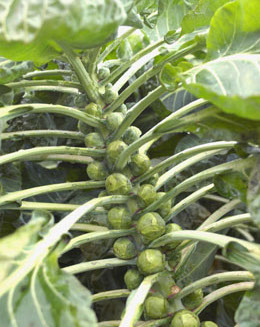Brussels sprouts are a seasonal vegetable belonging to the cabbage family. Growing them from seeds, is not as difficult as it seems to be. This Buzzle article gives you all the information regarding growing these.

Belonging to the family
Brassicaceae and genus
Brassica, the plant develops sprouts, small heads resembling miniature cabbages along the axils of each leaf. This seasonal crop is frost resistant and grows best during winters or in slightly frosty weather. Brussels sprouts require a long growing period and when planted during late spring to early summer, it yields healthy, high quality sprouts as the weather begins to cool. Given below is the proper way of growing these sprouts in your home.
Planting
These sprouts are tolerant of nearly all soil conditions, except acidic soil. A firm nitrogen rich soil having pH levels between 6-6.5 is best for their growth. Before sowing the seeds, dig some organic content in the soil, to retain its moisture retention properties. The most preferable time to sow the seeds, is during mid spring to late summer. Hence, sow the seeds in small pots, and after the seedlings are about 6 inches in height or 5-6 weeks old, plant them in your garden soil. Add fertilizer and water while planting, and try maintaining the temperature up to 75°F for best results. The sprouts dwell well in sun or partial shade, and since they are top heavy, keep them from planting in areas that have strong winds.
Harvesting
Sprouts that are about 2-2.5 cm in diameter or ones that have started developing yellow lower leaves, can be picked. Cut them off the stem and remove all the loose leaves. Don't let them grow too large, else they may start cracking, and become bitter. You can also pluck them, by taking off the yellowing leaves, and gently twisting the sprouts off.
Fertilizers
Before transplanting or sowing seeds, it is recommended to fertilize the planting site, by adding 10-10-10 fertilizer to it. Once the sprouts start growing, add 1 tbsp (15 ml) per plant of 5-10-10 fertilizer, or you can also use one large handful of good compost. Sprinkle around the base, and add water. Remember, not to add fertilizer to the stem, as the growth of the plant may get hampered.
Pest Protection
Like other cabbage family members (cabbage, kale, cauliflower, and broccoli), Brussels sprouts are also susceptible to some common soil borne fungal and viral diseases like club root caused by aphids and cabbage worms. You can use row covers to deter pests like flea beetles, cabbage worms, and root maggots from damaging the sprouts.
Since Brussels sprouts have shallow root system, ensure that you don't damage its roots while maintaining the soil. For best yield, apply nitrogen fertilizer after every three weeks during its growing season and water frequently.






 Belonging to the family Brassicaceae and genus Brassica, the plant develops sprouts, small heads resembling miniature cabbages along the axils of each leaf. This seasonal crop is frost resistant and grows best during winters or in slightly frosty weather. Brussels sprouts require a long growing period and when planted during late spring to early summer, it yields healthy, high quality sprouts as the weather begins to cool. Given below is the proper way of growing these sprouts in your home.
Belonging to the family Brassicaceae and genus Brassica, the plant develops sprouts, small heads resembling miniature cabbages along the axils of each leaf. This seasonal crop is frost resistant and grows best during winters or in slightly frosty weather. Brussels sprouts require a long growing period and when planted during late spring to early summer, it yields healthy, high quality sprouts as the weather begins to cool. Given below is the proper way of growing these sprouts in your home.